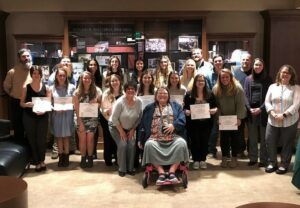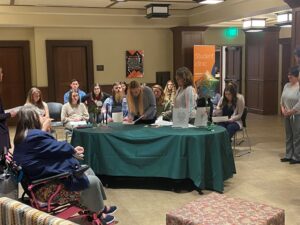GREENEVILLE – High-achieving biology and environmental science students at Tusculum University have earned placement in a newly established honor society at the higher education institution and will have further opportunities to advance their studies and be civically engaged.

Honor society members, Tusculum faculty members and a TriBeta representative participated in an induction ceremony.
Seventeen students were recently inducted into Tusculum’s Kappa Delta Eta chapter of Beta Beta Beta. This is an honor society for students, particularly undergraduates, who are dedicated to improving the understanding and appreciation of biological study and extending boundaries of human knowledge through scientific research.
Dr. Susan Monteleone, an associate professor of biology at Tusculum, worked diligently to establish a biology honors society on campus. Fellow faculty members in the Natural Sciences Department joined her in welcoming these students into the Tusculum chapter of TriBeta.
“Induction into this honor society is tremendous affirmation for these students because they are committed to strong academic performance and development as career-ready professionals,” Dr. Monteleone said. “It is also an excellent outlet for them to continue honing their employment skills with additional active and experiential learning opportunities and demonstrating their understanding of the importance of civic engagement. This is an impressive group.”
The inaugural members are:
- Gracie Akins
- Sarah Calfee
- Joseph Calloway
- Jaelyn Collins
- Brianna Garcia
- Ashley Harbison
- Sophie Henry
- Mirna Jacinto-Ramirez
- Allison Keen
- Breanna Mathes
- Melody Mercer
- Averie Price
- Keylon Reynolds
- Braden Seaton
- Arisa Timoll
- Ashley Waggoner
- Jyclyn West
Research is a key component of undergraduate studies at Tusculum, with students across multiple disciplines participating in this academic exercise. Dr. Monteleone said students in TriBeta will be encouraged to apply for its research funding, and the results of that work might appear in BIOS, the honor society’s publication. Faculty will also urge these students to present their research at regional Association of Southeastern Biologists and national TriBeta meetings.

Sophie Henry registers her name as a TriBeta member during a recent ceremony.
In addition, Tusculum TriBeta members will choose service projects to adopt in the community. That aligns with Tusculum’s mission to inspire civic engagement among students, who can strengthen the quality of life in their communities with their service. These students will also promote conservation practices and sustainability at the university.
Through the society and Tusculum, these students are led to apply their abilities for the benefit of humanity, Dr. Monteleone said.
To qualify for the honor society, students must:
- Have completed at least one term of the second year of a four-year curriculum or its equivalent
- Have completed at least three semester courses in biological science, of which at least one is not an introductory course, with an average grade of B or its equivalent
- Have a B average in all courses
- Be in good academic standing
“Our biology and environmental science programs prepare students for success through one-on-one mentoring by faculty and opportunities for our students to expand their knowledge in diverse ways inside and outside the classroom,” said Dr. Heather Henson-Ramsey, dean of the College of Science, Technology and Mathematics. “We are excited to bring this honor society to Tusculum and showcase the talent among the students within these programs. We are confident these TriBeta members will produce impressive results throughout their careers that will benefit their communities.”
More information about the university is available at www.tusculum.edu. To learn more about the honor society, please visit https://www.tribeta.org/.


